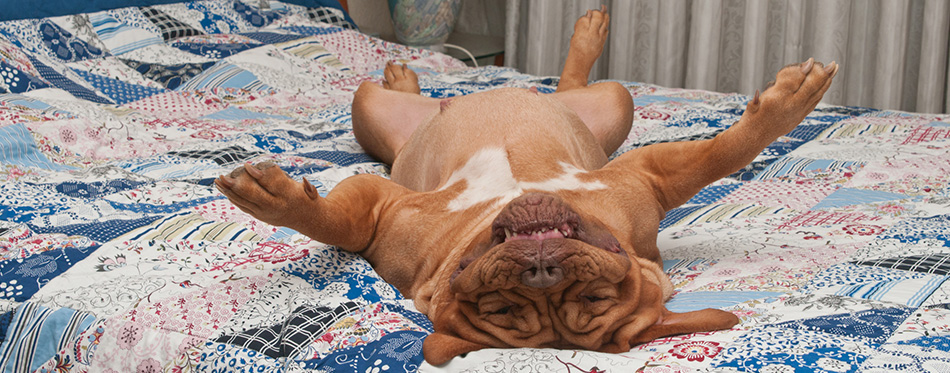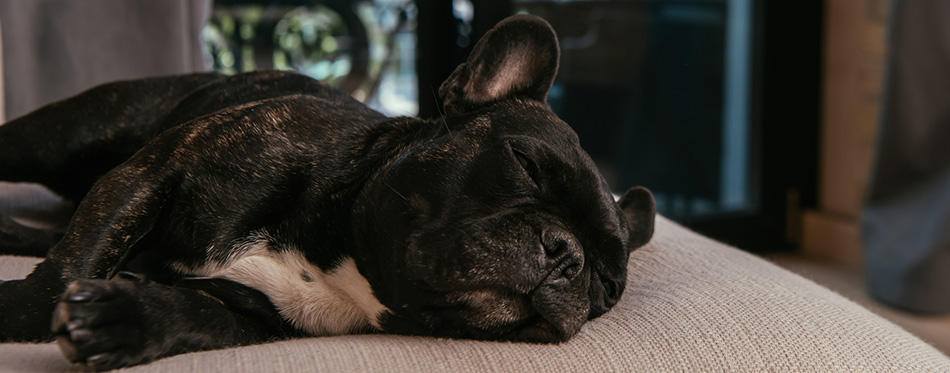Your pup’s snuffles and sleepy sighs may be super-cute but if you have a canine that is a full-on snorer it’s not always so much fun. Some pooches can really turn up the snoring volume come bedtime and while it can be annoying, it can also be a sign of a possible underlying cause. Most snoring in dogs is harmless and can be easily resolved, but in some instances, it may be wise to get things checked out. We take a look at why dogs snore and explore some of the main reasons behind it, so you can help your pooch turn down the volume and restore some peace to your home.
What is Canine Snoring?
It’s not just humans that snore, your four-legged friends can also be prolific snorers too and it is all down to a restriction of air as it moves across the nasal passages or throat. Whether it’s an obstruction, inflammation of the soft tissues or simply their sleeping position, air can be blocked at the back of the throat as your dog breathes in, creating a vibration sound we recognize as snoring. The severity of the obstruction and the sleeping stage your pet is at will also dictate the noise level, creating a snoring sound that ranges from soft and gentle to loud, raspy or labored.

The Top Reasons Why Your Dog Snores
There is actually a medical term for snoring – inspiratory stridor – and while in most cases it is harmless, there can also be some health or environmental answers to the question – why does my dog snore?
- Breed
There are some dog breeds that are more pre-disposed to snoring than others and these dogs are the more flat-faced variety, where their airways are shorter and so not as effective in moving air in and out. These breeds are known collectively as brachycephalic and include dogs such as bulldogs, pugs and boxers. With their short snouts and broad, flatter skulls, they also have softer palates which all cause their nostrils to collapse, making that snoring sound as they rest all the more likely. This doesn’t mean that if you don’t have a brachycephalic dog you are out of the snoring woods, as all dogs can snore but with these short snout breeds, some level of snuffling and snoring is inevitable. However, it is essential to know what is normal for your pooch, and even if they are short snouted, if they don’t usually snore but then suddenly start, it may be worth getting them checked out. And this counts for puppies snoring too.
- Obesity
If your pooch is carrying excess weight, then this can have a bearing on their breathing, leading them to snore. When a dog is obese, extra fat can gather around the throat, restricting the airway and causing them to snore. Obesity in dogs is not good for a host of health reasons and should be addressed through correct diet and exercise. And when it comes to snoring, it can be a sign that things really are not well. Fat around the throat can even cause the trachea to collapse which is a dangerous situation for your pet and can make breathing in general difficult. So, if you have been turning a blind eye to your pooch’s ‘puppy fat’ and they suddenly start snoring or have difficulties in their breathing, get him to the vet pronto so you can start him back on a healthy weight loss and activity program. Check out our guide on dog food for weight loss for more info.
- Dental problems
Problems with your dog’s teeth and mouth can also cause them to snore, as infection fills oral cavities or their sinuses. Abscesses in the gums can also cause breathing issues and left untreated will leave your dog in discomfort and pain. A regular oral hygiene routine should help to keep their mouths healthy and enable you to spot any problems before they become serious, but if you suspect dental problems, and notice your dog is snoring more, then get his teeth checked out.
Take a look at our reviews of the Best Dog Toothpaste and Best Dog Toothbrushes for more info.
- Sleeping position
Sometimes the cause of a dog’s snoring can be the simplest of things, such as their sleeping position. How your pup sleeps will affect the level at which air can easily flow in and out so if they are habitual snorers but otherwise healthy, have a look at how they prefer to sleep.
Just like humans, canine back sleepers can be snorers as their tongue drops back into the throat, causing an obstruction and making it harder for them to breathe quietly. One immediate fix is to gently move them, so they are laying on their side. A small pillow, or a dog bed with a pillow built in can make it less likely they will then roll over on to their back.
- Sleep apnea
Another possible reason for chronic canine snorers is a condition called sleep apnea. With sleep apnea, your dog’s breathing will become shallower and they can even stop breathing for a moment as they sleep. When they breathe again, it is usually with a sharp intake of breath, which gives a loud snoring sound. Sleep apnea can be a dangerous condition for your pet and will also disturb their sleep patterns, meaning they don’t get enough of deep or REM sleep, so wake up tired and unrefreshed. If you suspect your dog has sleep apnea, observe their sleeping to see if their breathing and snoring patterns fit, and if so, make an appointment to discuss it with your vet.
- Colds, allergies and irritants
‘My dog snores and sounds congested’ – if this is your issue, then it could well be down to environmental factors or even the common cold. Congestion caused by a cold means all that excess mucus can inflame and obstruct your dog’s airway, making breathing more of an effort. Known as rhinitis, this infection can also lead to a short-term bout of canine snoring until their cold has run its course.
Similarly, allergies can inflame their nasal soft tissues, increase mucus production, and increase the chances of your dog succumbing to the snore. If your pet starts snoring at certain times of the year or in certain environments, they could well be allergic to dust, pollen, perfume or other pets in your home. Once you know the source of their allergy you can take steps to reduce your dog’s exposure and hopefully reduce their tendency to be a noisy sleeper.
- Fungal disease
Aspergillosis is a fungal disease which affects both humans and dogs and can lead to restricted breathing and snoring. The condition occurs if your dog has inhaled mold spores which can be located in hay, grass, dusty areas or garden compost piles and causes irritation in their nasal cavity. If your dog spends a lot of time out in your garden or yard or can come across potential sources of the fungal spores on their daily exercise route, then this could well be the reason why they suddenly start to snore. Symptoms of aspergillosis include breathing issues, sneezing and nasal discharge and will need treating with antifungal meds to get it under control.
Related Post: Air Purifier for Pets
- Second-hand smoke
Tobacco is a known irritant of the nasal passages and soft tissues of the throat so if you have a smoker in your home, then this could be the reason behind your dog’s loud snoring. When irritated, the delicate tissues of the throat and nose swell and close, restricting air as your pet breathes in, making that familiar rasping sound of a canine snorer. If there are no other reasons for their snoring, then keeping your pet away from tobacco smoke, or even better, making your home a smoke free zone should soon see your pup breathing easily.

Ways to Prevent Your Dog from Snoring
While getting your snoring pet checked out by a vet is not a bad idea, chances are it’s their breed or environmental factors that are turning your pup into a chronic snorer. In most cases, those sleeping snuffles are harmless, but they do interrupt their sleep, so here’s a few suggestions as to how to stop a dog from snoring:
- If your dog is a little on the chubby side, then now is the time to help them to lose those extra few pounds to stop their snoring becoming a chronic problem. Up their exercise, feed them a healthy, portion-controlled diet and cut back on treats and you should soon see both their weight drop and their snoring volume turn right down.
- For canine snorers who are back sleepers, then create a sleeping environment that supports them to sleep on their side. A pillow – to either rest their head and neck on or to support their back as they sleep side on – can work wonders. Or look at investing in a circular dog bed which encourages your pooch to curl up as they sleep, keeping their neck elongated and airways nice and open.
- Improve their environment to reduce any allergies or irritants and to enable clean, deep and easy breathing. Keep your pet away from any known allergies, ensure rooms are sufficiently ventilated and not too warm and if you can invest in an air humidifier, which will add extra moisture to the air and naturally lubricate their airways as they breathe.
When to Seek Help
Whilst annoying, snoring is generally harmless but there are situations when you need to get your snoring pooch checked out by a professional. If your dog has never been a snorer but all of sudden starts to snore and struggle with their breathing, especially when they are asleep, then this needs to be investigated to ensure there is nothing more concerning going on. Physical obstructions, anatomical deformities, tumors or foreign bodies can cause snoring and need to be looked at or removed to ensure there’s no long-term damage or breathing issues. And if you buy a pup from a brachycephalic-type breed, a quick check up by the vet can help to identify any other associated issues that may need treatment or management.
And as with all things to do with your precious pooch, if you are in any doubt or concern, get them checked out. A quick visit to the vet could well mean both you and your pet finally get a good night’s sleep!
Sources:
- ABNORMAL SOFT PALATE, OBESITY, OR EDEMA CAN CAUSE SNORING – VetMed Illinois
- Caring for Brachycephalic Dogs – MSPCA Angell

